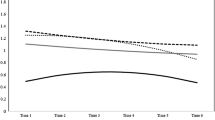Abstract
Three hundred children (ages 18–27 months) were observed as they entered peer play groups consisting of 12–15 children and 2–3 caregivers. One hundred and sixty-eight of the children were boys and 142 were girls. A schedule was used that allowed the observer to code the child's behavior and the reaction of peers and caregivers to that behavior. Four different categories of child problems were selected for study: conduct problems with aggression, withdrawn undersocialized behaviors, separation anxiety, and dependent personality. Three different questions were asked concerning the persistence and consequences of problem behaviors in toddler children: Do the behaviors persist over a period of 1 year to 2 years; what kinds of reactions does a child who is engaged in the behaviors defined in these categories receive from peers and teachers; and how do the reactions received from peers and teachers of problem children compare to those of the average of their own class? The stability of problem behaviors and the reactions received by the child were related to gender of the child and sexappropriateness of the behavior.
Similar content being viewed by others
References
Bell, R. Q. (1983). Age specific manifestations in changing psychosocial risk. In D. C. Farran & J. D. McKinney (Eds.),The concept of risk in intellectual and psychosocial development. New York: Academic Press.
Crowther, J. H., Bond, L. A., & Rolf, J. E. (1981). The incidence, prevalence, and severity of behavior disorders among preschool-aged children in day care.Journal of Abnormal Child Psychology, 9, 23–42.
Fagot, B. I. (1981). Male and female teachers: Do they treat boys and girls differently?Sex Roles, 7, 263–271.
Fagot, B. I., & Hagan, R. (in press). Aggression in toddlers: Responses to the assertive acts of boys and girls.Sex Roles.
Fagot, B. I., & Hagan, R. (198x).Reactions to assertive and communicative acts. Manuscript submitted for publication.
Kagan, J. (1979, June 25).Continuity and change in behavioral development in retrospect and prospect. Invited address to International Society for the Study of Behavioral Development, Lund, Sweden.
Olweus, D. (1979). Stability of aggressive reaction patterns in males.Psychological Bulletin, 86, 852–875.
Richman, N., Stevenson, J., & Graham, P. J. (1982).Preschool to school: A behavioral study. New York: Academic Press.
Serbin, L. A., O'Leary, K. D., Kent, R. H., & Tonick, I. J. (1973). A comparison of teacher response to the preacademic and problem behaviors of boys and girls.Child Development, 44, 796–804.
Sprafkin, C., Serbin, L. A., & Elman, M. (1982). Sex typing of play and psychological adjustment in young children: An empirical investigation.Journal of Abnormal Child Psychology, 10, 559–568.
Author information
Authors and Affiliations
Additional information
Data analyses were supported by BRSG Grant RR07080 awarded by the Biomedical Research Support Grant Program, Division of Research Resources, National Institutes of Health. The final write-up was completed on a postdoctoral fellowship (Grant No. 1 T32 MH 169555-01) through the Oregon Social Learning Center.
Rights and permissions
About this article
Cite this article
Fagot, B.I. The consequents of problem behavior in toddler children. J Abnorm Child Psychol 12, 385–395 (1984). https://doi.org/10.1007/BF00910654
Issue Date:
DOI: https://doi.org/10.1007/BF00910654




